A PETA Asia Investigation
Hey, Tourists: That Civet Cat Poop Coffee Hurts Animals and Might Kill Us All
In 2024, PETA Asia investigators went to farms in Java that produce kopi luwak and found sick Asian palm civet cats with bloody, open wounds languishing inside tiny wire cages encrusted with their own feces.
Many of the animals were malnourished or undernourished and had lost enormous patches of fur, were suffering from parasitic infestations, and had painful, gaping wounds. One civet cat appeared to be partially blind. Several of them paced and spun incessantly inside their cages—signs of zoochosis, a psychological disorder caused by the extreme stress, anguish, and frustration of intense confinement.
One farmer even fed coffee cherries to caged, illegally held binturongs—an animal red-listed as “vulnerable” on the International Union for Conservation of Nature’s Red List of Threatened Species—so that the excreted cherries could be falsely labeled and sold as civet coffee.
Undercover footage shows one critically ill civet cat—who was too weak even to stand up—lying motionless in a squalid cage. After being notified of the animal’s condition, the farm’s owner said he wanted to “throw (them) away.” PETA Asia’s investigator rushed the animal to a veterinary clinic, but despite receiving intensive care, the cat couldn’t be saved.
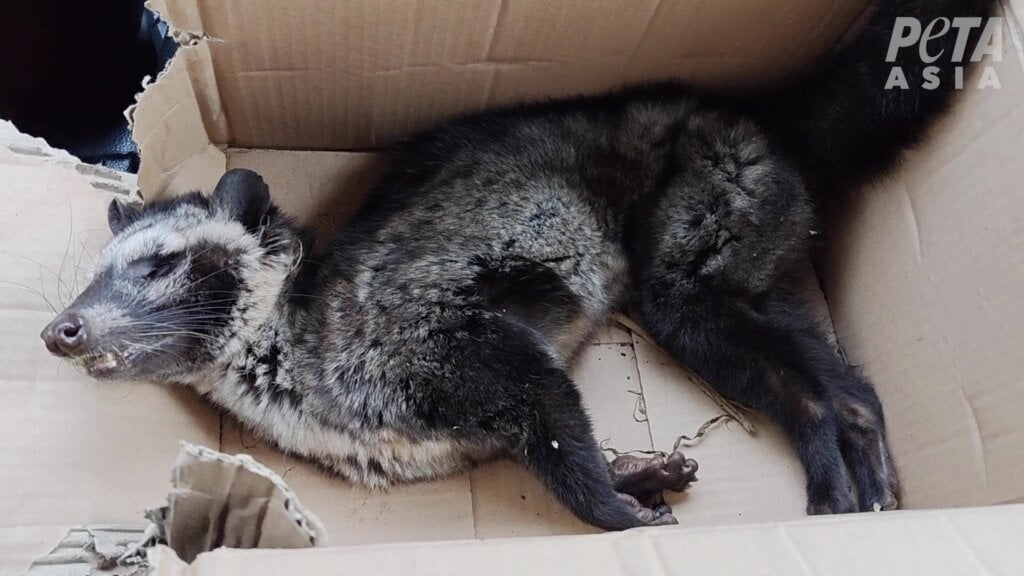
This stressed, terrified civet cat is just one of the many suffering animals our investigators filmed during their third look inside kopi luwak farms in Indonesia, the world’s top producer of civet cat coffee, in 2020.
He paced and circled, desperate to escape his filthy prison cell. He had no choice but to eat unnatural amounts of coffee cherries so that his excrement can be sold as kopi luwak or “civet cat poop coffee.” He was snatched from his home in nature and forced to endure continuous contact with humans, whom he naturally fears, and this drove him insane.
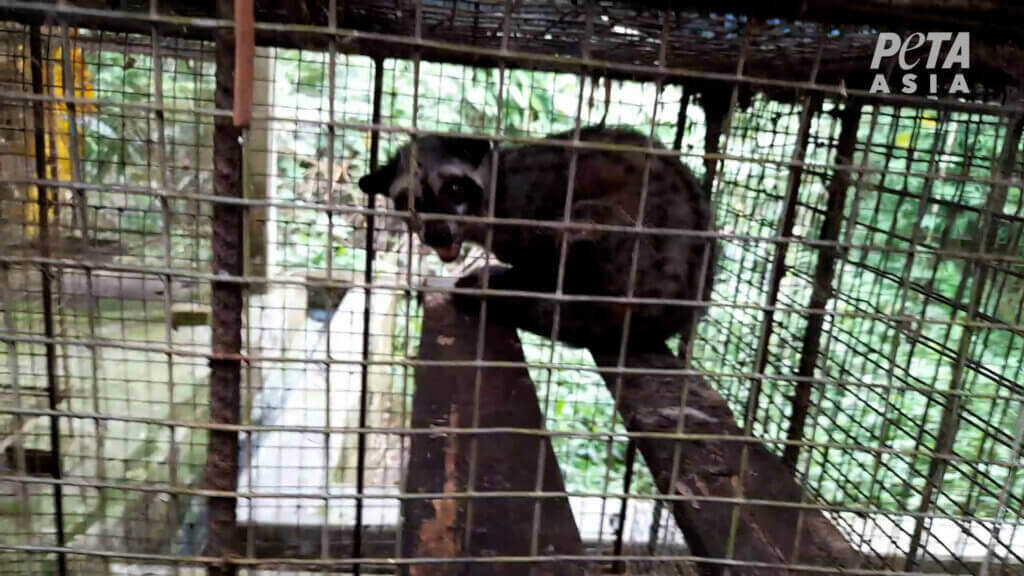
“Kopi luwak,” or “civet cat poop coffee,” can be found in cafés and coffee gardens worldwide. Unsuspecting tourists from all over the world, including the United States, visit such cafés, where they’re duped into buying the coffee and seeing the normally solitary civet cats in a setting that hides their cruel treatment. Now, tourists can see what really happens to civet cats who are exploited for coffee.
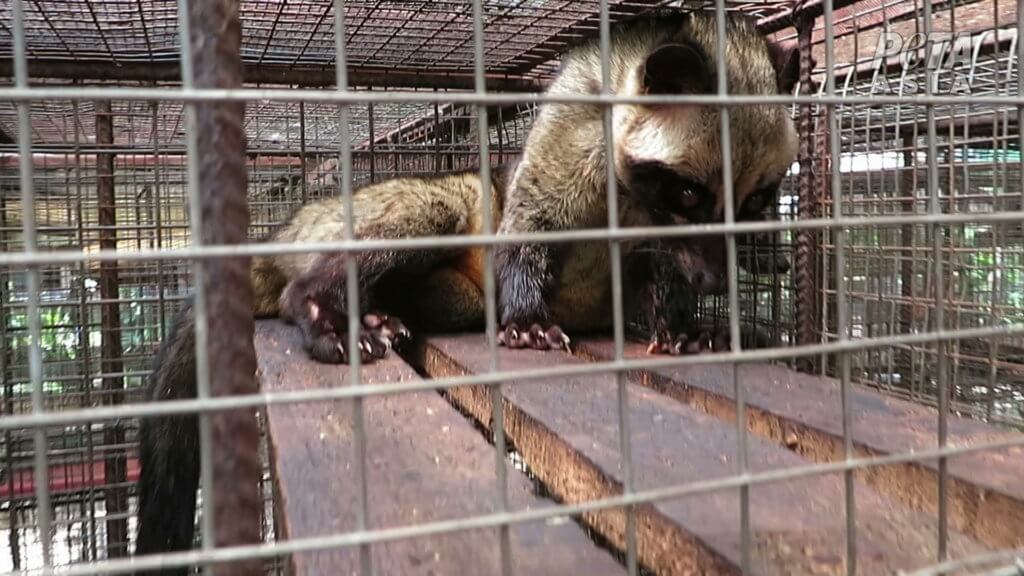
Although Asian palm civets are a protected species under the Convention on International Trade in Endangered Species of Wild Fauna and Flora, these most recent findings mirror what investigators uncovered during previous exposés of the kopi luwak industry: pervasive cruelty on every single farm. PETA Asia investigators found civet cats in cages encrusted with feces, rotting coffee cherries, and other filth. With no dark place to sleep, the nocturnal animals were deprived of adequate rest, and they panted incessantly in the inescapable heat. Investigators saw several with open, bloody wounds who didn’t appear to have received any veterinary care. Many were losing their fur because of malnourishment. In nature, civet cats eat a naturally varied diet, but kopi luwak producers make them ingest an unhealthy amount of coffee cherries in order to maximize profits.
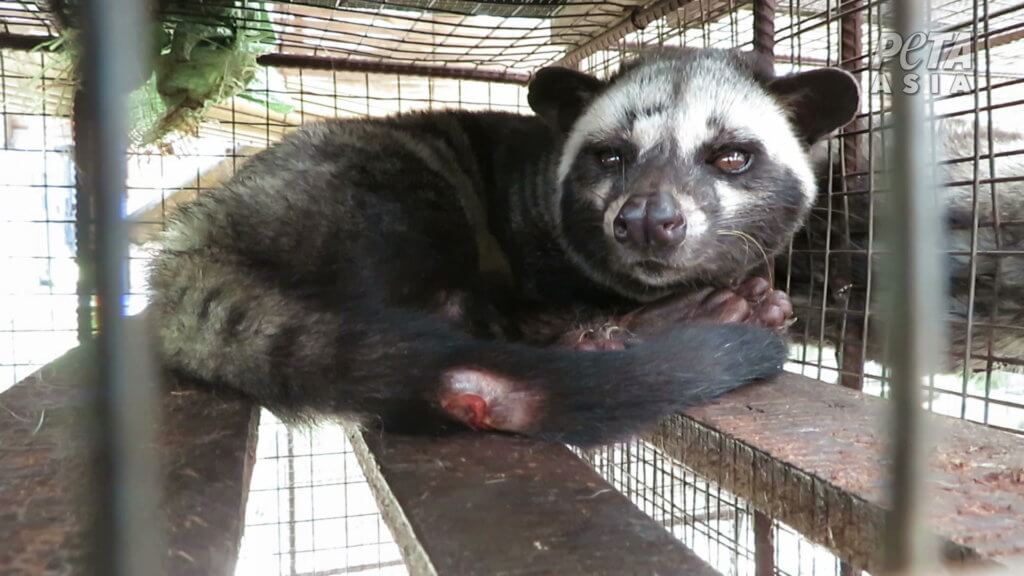
In 2020, PETA Asia investigators visited civet cat farms in Bali, Indonesia, and found deplorable conditions at every one. They also went to a live-animal market, where potentially sick civet cats are sold, and saw how easily they could spread deadly diseases to other animals, including humans.
‘Wild-Sourced’ Is Wildly Untrue
Since the release of PETA Asia’s multiple investigations into the industry, spanning a decade, many businesses have made the compassionate decision to pull kopi luwak from their shelves and cut ties with this cruel industry. Others, including distributors in Japan, one of the biggest markets for kopi luwak, choose to continue profiting from the animals’ misery for a novelty product that no one needs, despite having heard from us about the rampant cruelty.
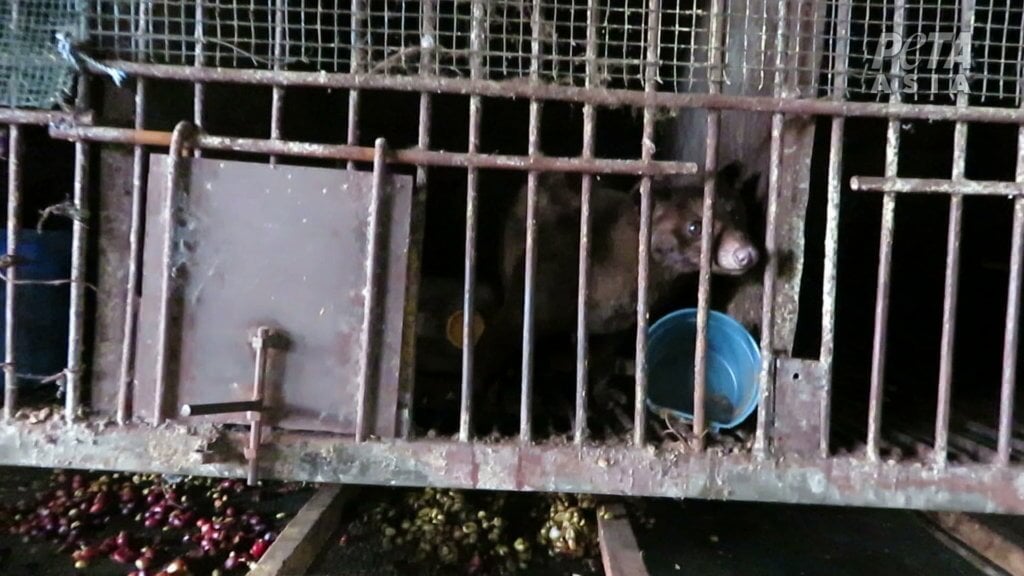
Customers and retailers are being deceived by producers who deliberately mislabel the coffee beans from captive civet cats as “wild-sourced.” PETA Asia investigators were told that it would be nearly impossible to collect enough wild civet cat excrement to produce the coffee. One producer admitted that a small amount of beans excreted by free-roaming civet cats may be collected and mixed with the beans excreted by caged animals and then given the misleading label “wild-sourced.” Another told an investigator that he could just put a “wild-sourced” label on the coffee produced by caged civet cats. This coffee can then be exported anywhere in the world.
One farmer explained that civet cats are generally kept caged for a maximum of three years before they’re released back into nature and that the stress of confinement and lack of adequate nutrition cause them to lose their fur. One farmer told PETA Asia’s investigator that some civet cats don’t survive after they’re released.
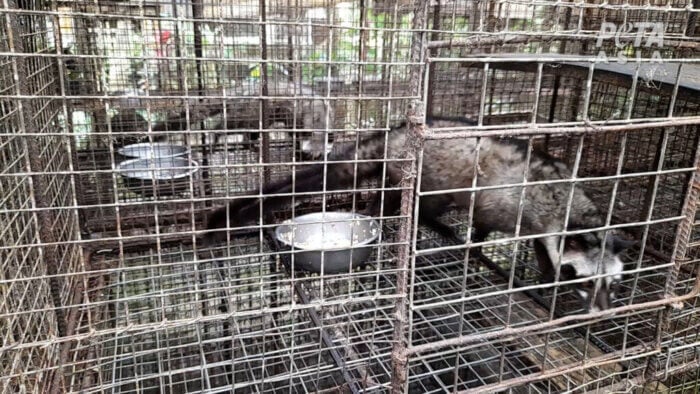
Brewing the Next Pandemic
The coffee is exported all over the world, even though, following the SARS outbreak in China, researchers found that the SARS coronavirus had jumped from civet cats to humans. Scientists have also identified civet cats as a possible “intermediate host” for COVID-19, potentially allowing the virus to mutate and pass from bats to humans.
Civet cats who are “lucky” enough to survive beyond their usefulness to the kopi luwak industry are sometimes sold at live-animal markets, just like the one in which the novel coronavirus is believed to have originated, putting them in direct contact with humans and providing the perfect opportunity for SARS or some other virus to mutate and jump from one host to another.
It’s Time to Cut the Crap
Kopi luwak isn’t a delicacy—it’s a disgrace. No matter which country you’re in or what assurances you’ve received, there is no ethically produced kopi luwak. Please don’t purchase or drink it.
PETA Asia sent companies, including Bacha Coffee, evidence that “wild” civet cat coffee is essentially a lie, but they’ve ignored requests to stop selling it. Please urge the company to stop funding cruelty to civet cats by ending the sale of kopi luwak today. In addition, if you see kopi luwak being sold by a retailer, please speak up!
